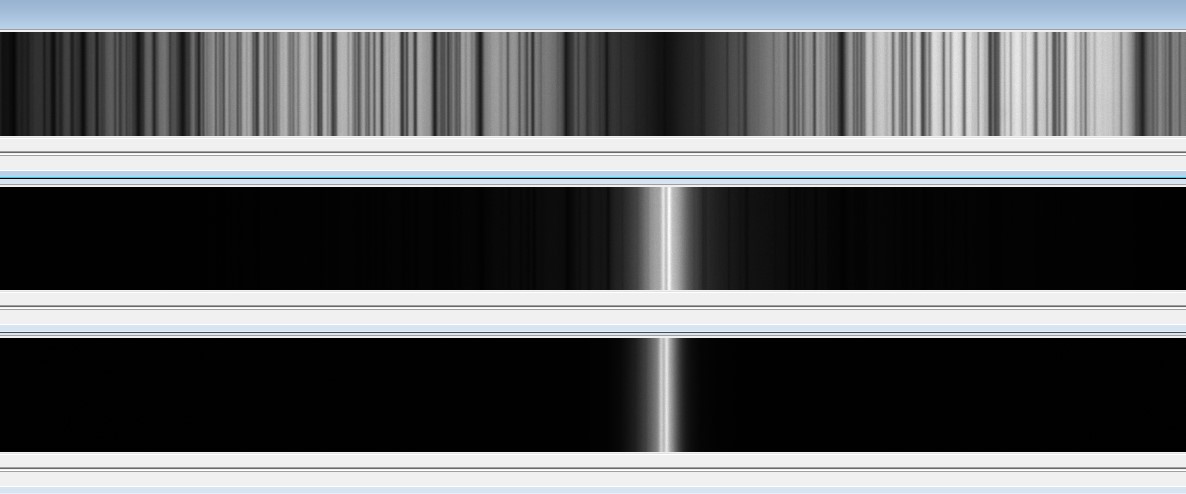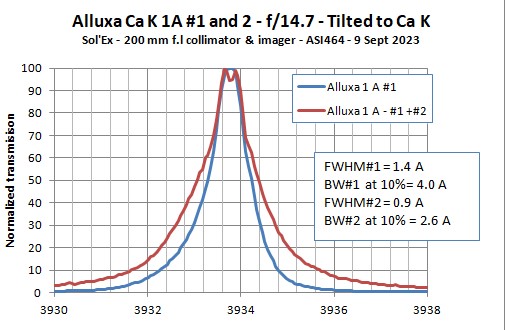| Filter | Test method | f-ratio | Surface measured | FWHM | BW at 10% peak transmission | delta CWL | Peak transmission (with tilted filters) |
| Stacked Alluxa 1 A Ca K #1 and #2 | Sol'Ex spectro (fc=fi=200 mm) |
f-14.7 | 10 micron × 4.5 mm | 0.9 A | 2.6 A | 0.0 A (both filters tilted to Ca K) |
filter #1 = 64% filters #1+#2 = 29% |
General information on these filters:
- one-cavity filter,
- fused silica substrate (0.04 A/°C temperature drift),
- 25.4 mm outside diameter.
- one-cavity filter,
- fused silica substrate (0.04 A/°C temperature drift),
- 25.4 mm outside diameter.
Measurement in f/14.7 beam
#1 - Optical set-up:
Sun >> Takahashi TOA 150 with 75 mm aperture stop >> Edmund Optics 394-10 nm + Alluxa 1 A Ca K filter(s) single or double stacked >> Sol'Ex spectrograph with 10 micron slit (10 micron × 4 mm), 200 mm f.l. collimating lens (re-focused on Ca K), grating : 2400 l/mm, 200 mm f.l. imaging lens >> ASI462 camera.
12-bit acquisition, except for the single-stack images done in 8-bit. Dispersion: 0.05822 A/pixel.
Blue sky.
9 September 2023.
From top to bottom :
- solar spectrum,
- spectrum filtered with the Alluxa 1 A Ca K filter tuned to Ca K (tilt),
- spectrum filtered with two Alluxa 1 A Ca K filters stacked and tuned to Ca K (tilt).
- solar spectrum,
- spectrum filtered with the Alluxa 1 A Ca K filter tuned to Ca K (tilt),
- spectrum filtered with two Alluxa 1 A Ca K filters stacked and tuned to Ca K (tilt).


Comments :
- the transmission profile is slightely skewed to the tilt of filters.
- the bump on the transmisison profile of the single-stack filter might be due to the 8-bit acquisition (instead of 12-bit for the solar spectrum and the double-stack combination).
Peak transmission with filters tilted to Ca K (uncertainties of about ±3%) :
- filtre #1 single stack = 64%
- filtre #1 + filter #2 = 29%
NB : peak transmission decreases when the tilt of the filter increases.
- the transmission profile is slightely skewed to the tilt of filters.
- the bump on the transmisison profile of the single-stack filter might be due to the 8-bit acquisition (instead of 12-bit for the solar spectrum and the double-stack combination).
Peak transmission with filters tilted to Ca K (uncertainties of about ±3%) :
- filtre #1 single stack = 64%
- filtre #1 + filter #2 = 29%
NB : peak transmission decreases when the tilt of the filter increases.